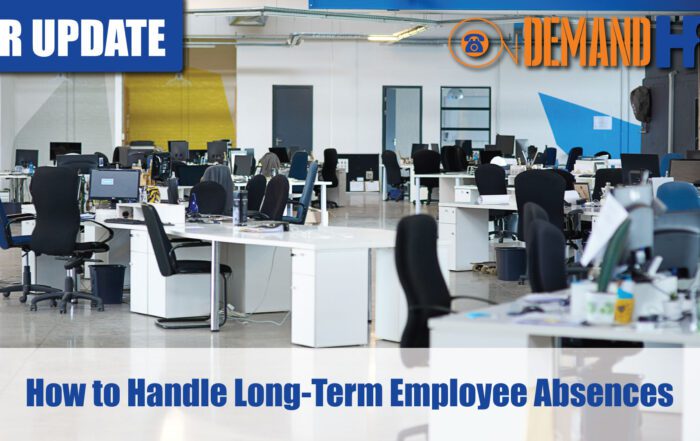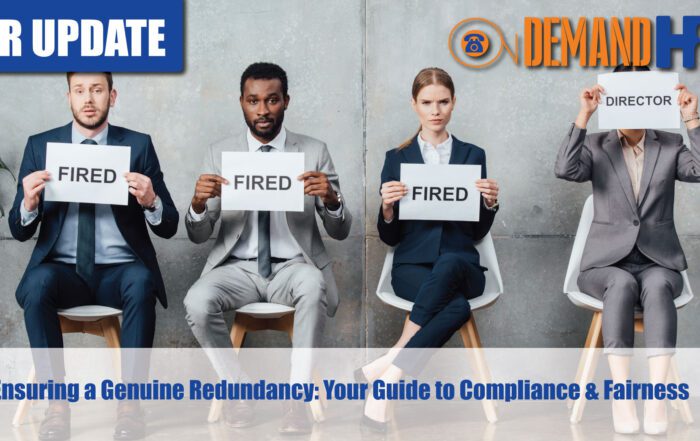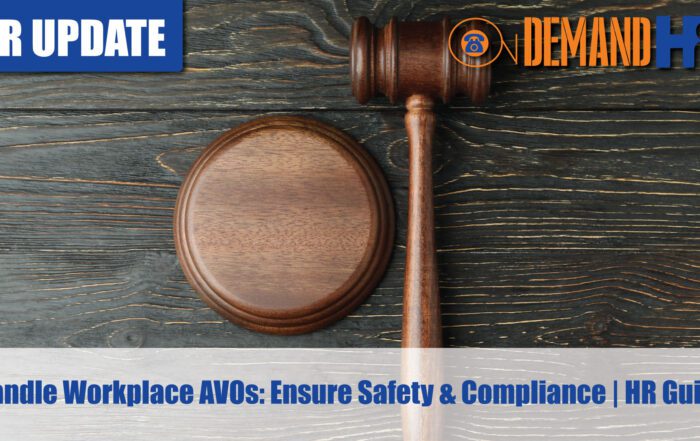The Great Resignation In Australia?
Recently you may have heard the media talking about something called the Great Resignation which is supposedly currently underway in the United States and coming to Australia in 2022.
But what is it really? Is it going to have as big of an impact on the Australian employment market as predicted. What if anything should businesses do to prepare?
Please see below for a full transcript of this video
Share the HR or workplace relations challenge facing your business and one of our experienced consultants will be in touch within 24 hours with a strategic action plan or discover the best strategy yourself by accessing out free online training library.
Transcript
00:00:00:05 – 00:00:16:21
Unknown
Recently, you may have heard in the media talking about something called the great resignation, which is supposedly currently underway in the United States and coming to Australia in 2022. But what is it, really? Is it going to have as big of an impact on the Australian employment market as predicted?
00:00:17:11 – 00:00:39:09
Unknown
And what, if anything, should businesses do to prepare? My name is Andrew Koleda from On Demand HR and to help tackle these questions and to enable businesses to start making plans and strategic decisions in this space, I’m joined by Stephanie Joseph, who heads up On Demand HR recruitment campaigns and whenever we have a question about what is the
00:00:39:09 – 00:00:55:14
Unknown
ground, truth is in the employment market. Or we need some insights about how to attract an ideal candidate for a challenging role. Steph’s the one that we turn to. So welcome, Steph. Tell us a little bit about what you do at On Demand HR and how long you been with us.
00:00:56:17 – 00:01:17:22
Unknown
Thanks, Andrew. I’m a senior HR Consultant at On Demand HR. I’ve been with On Demand HR for the last four years. Essentially, one of my key focus areas is on running recruitment campaigns for our clients, supported by a couple of our junior staff and the differences between running a recruitment campaign and one of the traditional recruiters that most of our
00:01:17:22 – 00:01:32:09
Unknown
clients are used to dealing with is that our campaigns appear internally run with the aim of being transparent to candidates rather than the business being referred to as our client and raising candidate suspicion around who’s hiring and what the role is.
00:01:33:09 – 00:01:49:12
Unknown
Our clients are involved in the interviewing and selection process, but we do a lot of the grunt work shortlisting candidates, phone screens, reference checks, negotiating offers and pre-employment checks like police checks. So tell us what a typical day looks like.
00:01:50:15 – 00:02:14:01
Unknown
Heading up On Demand HR recruitment campaigns, we generally start most days by reviewing our candidates who come in overnight shortlisting any of those and sending unsuccessful responses to those that we reject. Sending that shortlist through to the hiring manager waiting for some feedback on the candidates before then conducting phone screens towards the afternoon.
00:02:14:18 – 00:02:32:15
Unknown
Following up with any interviews that have been conducted, passing on feedback to the candidates, conducting any reference checks for those that have been successful and sending out any offers. So recently there’s been a lot of media attention given to the phenomenon they’re calling the great resignation.
00:02:33:02 – 00:02:57:05
Unknown
So in simple terms, what are they talking about? The Great resignation supposedly started in the US, where over 9 million employees left their jobs from 4000 companies surveyed in the month of August. It suggested that the US began to return to pre-pandemic life at about this time and that there was abnormally high levels of resignations being experienced throughout
00:02:57:05 – 00:03:18:01
Unknown
Covid across the globe. We did see a significant reduction in employee turnover essentially caused by the uncertainty around COVID 19 itself, but also the varied responses to COVID by governments across the world. We were in general finding that candidates were unwilling to resign from their current jobs, and they weren’t confident that they would find a
00:03:18:01 – 00:03:29:01
Unknown
new one. And not only that, if they did find a new one, whether that role would be secure or whether they would then be faced with the possibility of being made redundant and not being eligible for redundancy in a short period of time.
00:03:29:15 – 00:03:45:03
Unknown
And it’s suggested that as Australia begins to open up, that we may see the same increase in labor market mobility, it seems it seems fair enough during times of uncertainty that people are unwilling to, I guess, change from change from one role to the other.
00:03:45:16 – 00:04:03:13
Unknown
Particularly here in Australia, where they’ve got some support from the government in order to try and keep people employed through the various schemes. So that seems like a, I guess, a logical thing to do. And as I guess confidence, employee confidence, business confidence starts to increase.
00:04:03:19 – 00:04:16:13
Unknown
Potentially, you know, employees may be looking to make the shift, but I guess the question is really, will they if they want to? Will they be able to? And is that going to be true across all segments across the recruitment market?
00:04:17:06 – 00:04:32:11
Unknown
So based on what you’re seeing on the ground in the recruitment market, in your view, are we going to see the same phenomenon the great resignation occur in Australia? And if that’s going to be the case, is it going to be consistent across all industries?
00:04:34:03 – 00:04:53:22
Unknown
We have been considering this great resignation in an Australian context, and we think it’s important to consider that leading into the emergence of Covid in early 2020, we were already seeing a period of record low unemployment rates, meaning the candidates were already spoiled for choice and could already make demands for higher salaries.
00:04:54:08 – 00:05:13:07
Unknown
And so we were seeing difficulty in the recruitment space already at this time from a recruitment sense we’re struggling to attract talent to fill our vacant positions more than we ever have. We’re being forced to adapt our recruitment process to ensure really fast response times.
00:05:13:23 – 00:05:34:22
Unknown
Any more than 24 hours at each stage from application through to placement is too long. We’re finding we’re losing candidates to competing roles. We’re forced to have difficult conversations with our clients to make hiring decisions in most cases, after only one interview where they might be used to having multiple interview processes before seeing any other potential candidates
00:05:34:22 – 00:05:51:23
Unknown
, perhaps only having one person be interviewed for a role. We’re also finding that we’re being forced to offer higher than average salaries, even for roles that traditionally we would have had lots of choice to attract the right candidate.
00:05:52:13 – 00:06:07:13
Unknown
For example, admin roles, we’re even having to increase what we would be offering to the market. We’re also finding, even in those admin roles, that we’ve got more than one campaign being run to attract the right person during the lockdown and restriction period.
00:06:07:14 – 00:06:20:14
Unknown
We obviously experienced a similar flight to security as the rest of the world did with employees in general. We had candidates very hesitant to resign from their current position, even if they weren’t satisfied with remuneration career prospects or culture.
00:06:21:05 – 00:06:35:11
Unknown
And this was further amplified by the various government support packages being offered, like JobKeeper the COVID Disaster Payment JobSaver In this environment, it’s no wonder that we saw employee turnover plummet and the talent pool dried up almost completely.
00:06:36:19 – 00:06:51:22
Unknown
The other byproduct of this is that Australia never saw the predicted 15% plus unemployment rates that were being thrown out by the media. Coming back to the question about whether Australia will see the wave of resignations described by the great resignation phenomenon.
00:06:52:18 – 00:07:09:19
Unknown
There may be levels of turnover increasing as candidates start to gain confidence in the environment stabilizing, but think the great resignation is likely to be more industry discriminative. Rather than seeing a great wave of resignations across all industries.
00:07:09:19 – 00:07:28:15
Unknown
We think what we might actually see is industry migration, where employees who were most affected by the restrictions, for example, those in hospitality, retail, hair and beauty to some level, perhaps even in construction, they are likely to look to develop transferable skills and move to other industries.
00:07:29:04 – 00:07:45:23
Unknown
With immigration having been on a two year pause, these roles are going to be particularly difficult to backfill, particularly as student visa holders traditionally were popular hire choices. We may also even see some migration from teaching and health workers, and these are some industries where vaccinations are being made mandatory.
00:07:47:03 – 00:08:09:14
Unknown
The great resignation may also be employer specific. For example, clients who haven’t adjusted to new methods of operating during the pandemic might be left behind as other businesses take steps towards recovery. OK, so if we’re going to see some level of of this great resignation, maybe not across it across the broader economy, but potentially siloed to some
00:08:09:14 – 00:08:29:01
Unknown
specific industries. Some, you know, because of, I guess, restrictions and security and some as a result of mandatory vaccinations, potentially. So it’s going to be siloed to those types of industries as we begin to open up through New South Wales leading the way.
00:08:29:01 – 00:08:52:13
Unknown
And then, of course, more broadly, Australia. What should businesses be doing in order to retain their key staff? We think we should be looking to maintain some of the flexibility that’s been offered to employees during the lockdown periods of, for example, perhaps coming back to the office partially rather than on a full time basis, maybe three days
00:08:52:13 – 00:09:12:19
Unknown
per week at home. The lockdowns demonstrated to many that their role can be effectively performed from home and that they can have greater work life balance by eliminating their morning and afternoon commute. Employers who demand a return to the office may be disadvantaged when trying to attract staff because we think that moving forward, flexibility is going to
00:09:12:19 – 00:09:32:03
Unknown
be a significant benefit offered by most employers when it comes to communication and engagement. Employees will be feeling again that they’re in a space of unknown and communicating the path out of the pandemic, even if we don’t have any clear plans, will reengage employees with the business and give them comfort that the business is taking steps towards
00:09:32:03 – 00:09:51:17
Unknown
post-pandemic operations, considering their employees and employees will then start to form some certainty around how the future might look. The other thing we’ve been doing recently is employee satisfaction surveys, and we’re finding that they’re highlighting any areas where the business may need to improve to retain valuable staff.
00:09:52:13 – 00:10:11:21
Unknown
We recently released some videos on this on the value of employee satisfaction surveys, and we do think that it would be important for clients to consider this. Moving out of the pandemic and reviewing the recruitment process is also another important factor to ensure that you’re out and that you’re able to identify a strong candidates interview and hire
00:10:11:21 – 00:10:32:23
Unknown
as soon as possible, keeping them from competing roles, eliminating the mindset of having multiple interview processes and requiring more than one candidate for interview before decisions are made. Okay, so what I’m what I’m taking out of this at a at a high level is that businesses need to move out of their panic mode or reactionary mode that
00:10:32:23 – 00:10:49:09
Unknown
they were under in the COVID 19 restrictions and just trying to, I guess, navigate through that and they need to shift their mindset into a little bit more strategic thinking. And they need to do this from what I’m hearing in probably two ways.
00:10:49:19 – 00:11:09:14
Unknown
Number one, they need to be realistic that it is in fact, a candidate’s market at the moment. I think a lot of businesses out there really having the perception that it’s an employer’s market whereby there’s going to be all these people that have lost their jobs throughout the pandemic and they’ll be able to put up a job
00:11:09:14 – 00:11:27:14
Unknown
ad if they choose to and they’ll get 1,000,000 applications. And so from what I’m hearing from you, that’s actually not the case. And we’re likely given our experience when lockdowns eased last time, we saw the unemployment rate really plummet to the pre-pandemic level.
00:11:27:21 – 00:11:44:15
Unknown
And we’re probably going to see the same thing now, particularly in New South Wales, as we start to reopen. The second thing that I’m hearing you say is businesses start need to start to really sit down and start thinking strategically about how they’re going to retain their
00:11:44:15 – 00:12:01:22
Unknown
Staff really identify, I guess, who are their key staff and what they’re going to do and what flexibilities. Potentially, they may allow their key staff in order to ensure that they’re going to retain them as New South Wales starts to reopen.
00:12:02:09 – 00:12:25:11
Unknown
And the third point is, if you are looking to recruit, the traditional methods of recruitment are likely to be challenged and strained during this period of reopening. If we’ve got a really tight labor market, you need to really start to rethink about how you go about recruiting for your employees, where you’re advertising how quickly you responding to
00:12:25:11 – 00:12:46:10
Unknown
your employees, how quickly you’re making decisions, and not simply relying on the old traditional process of whacking an ad up on Seek waiting for the applications to come in. Interviewing 15 people and delaying the process for a couple of weeks before you make an ultimate decision, you just simply can’t afford to do that.
00:12:46:19 – 00:13:08:17
Unknown
Is there anything else that that you think businesses or employers should sort of take on on notice during this period of reopening now out of the restricted period for New South Wales? All of these things, regardless of whether we are in a candidate’s market or an employer’s market, we should be looking overall to retain our high performers
00:13:09:05 – 00:13:27:16
Unknown
On Demand recruitment campaigns, try to optimize our recruitment efforts at every level. But we highly recommend our clients consider their retention strategies as we come out of lockdown. Yeah, that’s a really good point, so if you’re looking to start thinking a little bit more strategically around your retention strategies for your employees and across the business
00:13:27:21 – 00:13:42:15
Unknown
, as New South Wales comes out of lockdown and want to organize a strategy session with Stephanie or any one of the other On Demand HR consultants, please reach out to us by visiting our website at ondemandhr.com.au.
00:13:43:00 – 00:13:46:10
Unknown
Thanks very much, Stephanie, and we’ll see everyone else on the next update.






